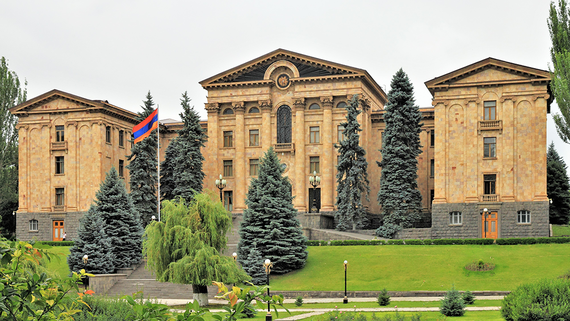The Armenian Parliament ratified the Rome Statute
[ad_1]

The Armenian Parliament has ratified the Rome Statute of the International Criminal Court (ICC), as follows from the voting results.
“60 deputies voted for ratification, 20 voted against. The decision has been made,” announced Speaker of Parliament Alen Simonyan (quote according to TASS).
The opposition boycotted the ratification of the ICC treaty. As deputies of the “I Have the Honor” faction noted, the authorities’ decision to ratify the Rome Statute is fraught with unpredictable consequences in connection with the current geopolitical situation. Thus, the decision to adopt the statute was made by deputies of Prime Minister Nikol Pashinyan’s “Civil Contract” party.
Armenia’s representative on international legal affairs, Yeghishe Kirakosyan, explained the need for ratification to have a “deterrent effect” for those who “intend to commit a crime” on the territory of the republic.
“Given the fact that the armed formations of Azerbaijan are still located on the sovereign territory of Armenia, the ratification of the charter is again justified,” he noted at the meeting, his words were quoted by the Armenpress agency.
Armenia signed the Rome Statute in 1998, but has not ratified it. In 2004, the Constitutional Court of the Republic recognized the obligations of the treaty as contrary to a number of provisions of the 1995 Constitution. In December 2022, the Armenian government appealed to the Constitutional Court with a request to recognize retroactively the jurisdiction of the ICC from May 2021. On March 24 of this year, the Armenian Constitutional Court decided that the obligations, set out in the Rome Statute are in accordance with the fundamental law of the country.
Russian authorities condemned the plans of the Armenian authorities. The Foreign Ministry stated that ratification was “unacceptable,” the consequences of which could affect bilateral relations. The Kremlin called Yerevan’s actions “extremely hostile” towards Russia.
On September 19, Azerbaijan began military operations in Nagorno-Karabakh. The very next day, the Karabakh authorities announced the conclusion of agreements on a complete ceasefire. After negotiations, the authorities of the unrecognized republic agreed to surrender their weapons under the control of Russian peacekeepers. Later, the president of the unrecognized republic Samvel Shahramanyan signed a decree on the termination of its existence from 2024 and the dissolution of all government institutions and organizations.
A week before the start of “anti-terrorist measures” in Baku, Pashinyan clarified that the ratification process is not related to relations between Yerevan and Moscow, but to tensions on the border with Azerbaijan. The Armenian government also noted last year that accepting ICC obligations would make it possible to hold Azerbaijan “accountable for war crimes.”
[ad_2]
Source link








